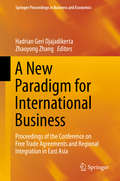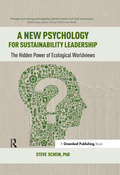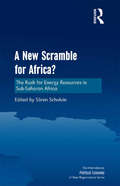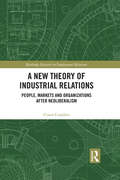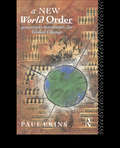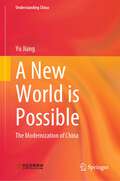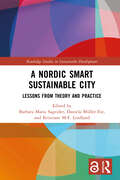- Table View
- List View
A New Paradigm for Greek Agriculture
by Kostas KarantininisThis book offers an assessment of new opportunities available for the agricultural sector and provides technical assistance to the Greek authorities with regards to its rural development and fishery sector. Karantininis follows a value chain approach and analyzes the Greek agri-food industry, breaking it down vertically and horizontally. Vertically, the Greek agri-food chain is stripped to its main upstream and downstream components: inputs, primary production, distribution and retail. Horizontally, the agri-food value chain is analyzed in terms of size, ownership, governance and space. The author pays special attention to policy formation, policy implementation, the political and industrial structure, land and credit markets, education, extension and research. The author focuses on this through three subcategories of fruits and vegetables, aquaculture and olive oil. A number of opinions and recommendations are presented in each section, concluding with propositions for a new institutional structure for Greek agriculture.
A New Paradigm for International Business: Proceedings of the Conference on Free Trade Agreements and Regional Integration in East Asia (Springer Proceedings in Business and Economics)
by Hadrian Geri Djajadikerta Zhaoyong ZhangThis book offers a collection of studies on regional integration and the dynamic business environment in East Asia. The papers included, originally presented at the 2014 Asia Pacific Business Conference on "Free Trade Agreements and Regional Integration in East Asia," examine the challenges and dynamics in the increasingly integrated East Asian markets and outline a new paradigm for doing international business in the region. The papers address diverse areas related to regional integration, financial markets, investment, trade and capital flow, sustainability, accounting and auditing issues, exchange rates, strategies and the regional business environment. The book provides a valuable resource for practitioners, policy-makers and students who are interested in understanding the vibrant aspects of business in today's East Asia.
A New Perspective on Agglomeration Economies in Japan: An Application of Productivity Analysis (New Frontiers in Regional Science: Asian Perspectives #20)
by Akihiro OtsukaThis book describes various methods of analysis for ascertaining the effects of agglomeration economies, which are important for formulating regional economic policies. Specifically, it describes new analytical approaches using productivity and productive efficiency analyses as methods for understanding agglomeration economies. Additionally, the book provides application results for Japanese regions and proposes desirable regional policies. According to the new analytical methods advocated in this book, agglomeration economies are larger in major metropolitan areas than in local regions, and in the manufacturing sector than in the non-manufacturing sector. These results are consistent with general knowledge. Moreover, the majority of productivity growth pertaining to regional economies is explainable by improvements to accessibility. Improving accessibility for regions reduces transportation costs between them and strengthens agglomeration economies, which, in turn, enable the sustainable development of regional economies. Therefore, this book highlights the need not only to reinforce existing agglomeration areas, but also to form a network between these agglomerations and to strengthen it, so as to realize regional economic growth despite a decreasing population.
A New Philosophy of Opera
by Yuval SharonFrom “the most imaginative director in the US” (New York Times) comes this generational work with a vision for transforming opera into a powerhouse cultural phenomenon. "This book builds a compelling roadmap for the future of opera, and how it can truly be accessible for everyone." —Gustavo Dudamel Known as opera’s “disrupter-in-residence,” director Yuval Sharon has never adhered to the art form’s conventions. In his many productions in both the United States and Europe, he constantly challenges the perception of opera as aloof by urging, among other things: performing operas in “non-places,” such as parking lots; encouraging the use of amplification; and shuffling the traditional structure of classic works, like performing Puccini’s La bohème in reverse order, ending not with the tubercular heroine Mimi’s death but with her first falling in love. With A New Philosophy of Opera, Sharon has crafted a radical and refreshing book that can act as an introduction to the art form for the culturally curious, or as a manifesto for his fellow artists. In an engaging style that ranges from the provocative to the personal, Sharon offers a 360-degree view of the art form, from the audience experience to the artist’s process; from its socially conscious potential to its economic reality; and from its practical to its emotional and spiritual dimensions. Surveying the role of opera in the United States and drawing on his experiences from Berlin to Los Angeles, Sharon lays out his vision for an “anti-elite opera” that celebrates the imagination and challenges the status quo. With an illustrated and unconventional history of the art form (not following a straight line but tracing a fantastical “time-curve”) weaving throughout the book, Sharon resists the notion of the opera as “dying” and instead portrays it as a glorious chaos constantly being reborn and reshaped. With its advocacy of opera as an “enchanted space” and its revolutionary message, A New Philosophy of Opera is itself a work of art—a living book with profound philosophical implications—that will stand the test of time.
A New Politics of Heritage Reconstruction in Afghanistan: In the Shadow of the Buddhas (Routledge Studies in Culture and Development)
by Constance WyndhamA New Politics of Heritage Reconstruction in Afghanistan investigates the politics of cultural heritage preservation in Afghanistan between 2008 and 2015. Based on several periods of ethnographic fieldwork and the author’s direct employment on several internationally-sponsored heritage projects, this book studies the new and complex intersections between cultural heritage and politics in Afghanistan. Wyndham argues that a particular configuration of heritage and politics has emerged after the destruction of the Buddhas at Bamyan and demonstrates how the characteristics of this ‘post-Bamyan’ heritage paradigm are revealed through a number of case studies of internationally sponsored heritage work. These case studies reveal how politics and heritage are currently configured across a diverse range of governments, state and non-state actors, NGOs, individuals and forms of expertise—and why such intersections matter. The book responds to a call from across the discipline of Heritage Studies to look more closely at the relationships between heritage, power and politics. A New Politics of Heritage Reconstruction in Afghanistan provides a fascinating case study on the intersection of heritage and politics that will be of interest to students and scholars of heritage, as well as to professionals working on heritage preservation - both within and outside of government.
A New Principles of Economics: The Science of Markets
by Carsten Herrmann-Pillath Christian HedererDespite the dynamic development of the discipline of economics, the ways in which economics is taught and how it defines its basic principles have hardly changed, resulting in economics being criticised for its inability to provide relevant insights on global challenges. In response, this book defines new principles of economics and seeks to establish economics as the science of markets. A New Principles of Economics provides an alternative conceptual framework for the study of economics, integrating recent developments and research in both economics and neighbouring social sciences. Adopting the structure of a standard principles text, it separates the study of markets as mechanisms and markets in their wider contexts. In doing so, a number of new perspectives are introduced, including approaching the economy as part and parcel of the Earth system; directly connecting the analysis of production with an analysis of technology and thermodynamic principles; explicitly treating markets as forms of social networks mediated by the institution of money; and reinstating the central role of distribution in political economy analysis. Drawing on the latest theories and research on the economy, and including both the natural and social sciences, this text provides a holistic introduction suitable for postgraduates and other advanced students.
A New Psychology for Sustainability Leadership: The Hidden Power of Ecological Worldviews
by Steve ScheinDuring the last decade, the sustainability position in multinational corporations has grown in influence. Much literature has explored how corporations can play an important role in solving the environmental challenges facing the planet. However, until now, there has been little research on sustainability leadership at the individual level. In this book, Schein explores the deeper psychological motivations of sustainability leaders. He shows how these motivations relate to overall effectiveness and capacity to lead transformational change and he explores the ways in which the complexity of sustainability is driving new approaches to leadership.Drawing on interviews with 75 leaders from over 40 multinational corporations and NGOs, Schein explores how ecological worldviews are developed and expressed in global sustainability practice. By applying key theories from developmental psychology, integral ecology and eco-psychology to sustainability practice, Schein encourages us to think about leadership in a different way. A New Psychology for Sustainability Leadership will be of interest to an interdisciplinary audience of social scientists, educators, corporate executives, and social entrepreneurs. The insights from this book can be usefully integrated into leadership curriculum and development programs to help the next generation of leaders respond to global challenges.
A New Scramble for Africa?: The Rush for Energy Resources in Sub-Saharan Africa (The International Political Economy of New Regionalisms Series)
by Sören ScholvinGlobal energy consumption will increase rapidly in the next decades. The discrepancy between demand and supply is worrisome within the old and new cores of the world-economy. Sub-Saharan Africa meanwhile possesses vast potential for energy resources to be further exploited. Whilst the Global North is a traditional player in the sub-Saharan energy sector, new actors from emerging economies - especially China’s state-owned enterprises but also Brazilian, Indian and South African giants - have entered what appears to be a scramble for the largely untapped energy resources of the region. This book is the first to bring together comparative perspectives on: · The strategies of state and non-state actors involved in the exploitation of sub-Saharan energy resources. · The potential and pitfalls of new forms of cooperation on energy southwards of the Sahara. · The domestic opportunities and challenges of the present energy resource boom. Dynamics on the international level are brought together with local developments to provide up-to-date insights on the scramble for energy resources in sub-Saharan Africa. This book also advances a materialist approach applicable in geographical and political-scientific research, showing that much insight can be gained by concentrating on the material environment that shapes economic and political phenomena.
A New Shirt: Real World Strategies for Identifying Purchasing Criteria, Understanding Segmentation, and Using NPV Analyses Strategically
by Jay Barney Patricia Gorman Clifford"What I Didn't Learn in Business School" is a fictional account that follows new consultant Justin Campbell as he joins an elite team hired by a chemical firm to assess the potential of a newly developed technology. Justin meets with the firm's chief financial officer, who challenges Justin's assumptions about financial analysis. Thankfully, with feedback from more experienced colleagues Justin begins to understand the role of a CFO. In this chapter, authors Jay Barney and Trish Gorman Clifford show how financial analysis often fails to present clear logic, how individual biases and corporate politics can affect a company's financial analysis, and how to develop better real-world strategies for dealing with these issues. This chapter was originally published as Chapter 2 of "What I Didn't Learn in Business School: How Strategy Works in the Real World."
A New Theory of Cultural Archetypes: Capturing Global Unity and Local Diversity
by David Midgley Sunil Venaik Demetris ChristopoulosThis book overcomes the limitations of existing models of national culture by presenting a novel archetypal methodology that captures heterogeneity within and between nations in a simple manner. The authors incorporate this methodology into a new, empirically derived theory of nations as composites of diverse culture configurations (or archetypes). The theory, which is illustrated through data on secular and emancipative values obtained from the European and World Value Surveys, shows the unity and diversity of these values across 117 nations, and identifies trends in global culture over four decades.Based on the authors' research, the book argues that universal archetypes capture the unity and diversity of the global cultural mosaic with precision and fidelity. By reflecting the reality of changing culture around the world with greater clarity, the book’s novel approach provides a comprehensive lens for international business scholars, practitioners, and policy makers to view, understand and explain culture-related phenomena.
A New Theory of Industrial Relations: People, Markets and Organizations after Neoliberalism (Routledge Research in Employment Relations)
by Conor CraddenMost existing theoretical approaches to industrial relations and human resources management (IR/HRM) build their analyses and policy prescriptions on one of two foundational assumptions. They assume either that conflict between workers and employers is the natural and inevitable state of affairs; or that under normal circumstances, cooperation is what employers can and should expect from workers. By contrast, A New Theory of Industrial Relations: People, Markets and Organizations after Neoliberalism proposes a theoretical framework for IR/HRM that treats the existence of conflict or cooperation at work as an outcome that needs to be explained rather than an initial presupposition. By identifying the social and organizational roots of reasoned, positively chosen cooperation at work, this framework shows what is needed to construct a genuinely consensual form of capitalism. In broader terms, the book offers a critical theory of the governance of work under capitalism. ‘The governance of work’ refers to the structures of incentives and sanctions, authority, accountability and direct and representative participation within and beyond the workplace by which decisions about the content, conditions and remuneration of work are made, applied, challenged and revised. The most basic proposition made in the book is that work will be consensual—and, hence, that employees will actively and willingly cooperate with the implementation of organizational plans and strategies—when the governance of work is substantively legitimate. Although stable configurations of economic and organizational structures are possible in the context of a bare procedural legitimacy, it is only where work relationships are recognized as right and just that positive forms of cooperation will occur. The analytic purpose of the theory is to specify the conditions under which substantive legitimacy will arise. Drawing in particular on the work of Alan Fox, Robert Cox and Jürgen Habermas, the book argues that whether workers fight against, tolerate or willingly accept the web of relationships that constitutes the organization depends on the interplay between three empirically variable factors: the objective day-to-day experience of incentives, constraints and obligations at work; the subjective understanding of work as a social relationship; and the formal institutional structure of policies, rules and practices by which relationships at work are governed.
A New Vision for Mexico 2042
by Claudio Loser Jose Fajgenbaum Harinder S KohliMexico is at a critical juncture. The next administration will assume power at a particularly crucial time in Mexico's economic and social development. Its priorities and actions will have a decisive impact on the country's long-term economic, social, and even, political trajectory. If the political paralysis that has prevented the last two administrations from tackling Mexico's fundamental economic problems continues for another six years, the country may slide from its current low-growth equilibrium into a vicious cycle of economic stagnation, and subsequently dash the peoples' hopes, further erode the government's credibility, and worsen the law and order situation. By contrast, if the new administration embraces a well-balanced reform agenda and adopts a package of bold initiatives early in its term, it could once again unleash Mexico's vast potential and build the foundations of a more prosperous, safer and dynamic society. A New Vision for Mexico 2042 identifies the priority issues that could influence Mexico's long-term economic trajectory, and outlines a balanced action program necessary to effectively address these issues. It includes reforms and actions that would simultaneously achieve much higher and more inclusive growth, and thus would restore the sense of pride and optimism among Mexicans that has been eroding in recent years. The issues discussed are ofsuch importance that the legacy of the next Presidency could well be determined by the administration's willingness and ability to implement the agenda outlined in this book.
A New Way for Mothers: A Revolutionary Approach for Mothers to Use Their Skills and Talents While Their Children Are at School
by Louise WebsterThere is incredibly important yet untapped talent among mothers who have replaced career aspirations or creative outlets with family priority. Those women who have put their interests on hold to care for their children face a huge challenge in re-connecting with the professional world again in a way that recognizes their needs to continue to be available for their children.This book will provide inspiration, encouragement, and a step-by-step approach for every mother wishing to engage their talents during the hours their children are at school. This book has strategies and tips for all aspects of life—from finding the right type of work to supporting your health—to help moms find purpose and balance through the crucial preschool years and beyond.
A New World Order: Grassroots Movements for Global Change
by Paul EkinsFirst published in 1992. Routledge is an imprint of Taylor & Francis, an informa company.
A New World is Possible: The Modernization of China (Understanding China)
by Yu JiangThis book gives a panoramic review of China's 70 years of modernization, reveals the historical process and logic of the formation of the modernization path with Chinese characteristics, especially focuses on the key decision-making process in the history of China's modernization, theoretically compares the Chinese model and the western mainstream model and summarizes the characteristics and experience of China's development model. At the same time, it reveals the causes of the global crisis from a historical perspective and puts forward the future of China based on historical experience. The book tries to answer the following hot-debating questions: What is the core of Chinese experience? Is China model a new model of modernization? Is China's model sustainable? Is this model compatible with the mainstream model? What is the relationship between China's revolution and modernization? How will China's development affect the world? This book will be found helpful by all scholars, students and the public who are interested in China's development path.
A Non-Random Walk Down Wall Street
by Andrew W. Lo A. Craig MacKinlayFor over half a century, financial experts have regarded the movements of markets as a random walk--unpredictable meanderings akin to a drunkard's unsteady gait--and this hypothesis has become a cornerstone of modern financial economics and many investment strategies. Here Andrew W. Lo and A. Craig MacKinlay put the Random Walk Hypothesis to the test. In this volume, which elegantly integrates their most important articles, Lo and MacKinlay find that markets are not completely random after all, and that predictable components do exist in recent stock and bond returns. Their book provides a state-of-the-art account of the techniques for detecting predictabilities and evaluating their statistical and economic significance, and offers a tantalizing glimpse into the financial technologies of the future. The articles track the exciting course of Lo and MacKinlay's research on the predictability of stock prices from their early work on rejecting random walks in short-horizon returns to their analysis of long-term memory in stock market prices. A particular highlight is their now-famous inquiry into the pitfalls of "data-snooping biases" that have arisen from the widespread use of the same historical databases for discovering anomalies and developing seemingly profitable investment strategies. This book invites scholars to reconsider the Random Walk Hypothesis, and, by carefully documenting the presence of predictable components in the stock market, also directs investment professionals toward superior long-term investment returns through disciplined active investment management.
A Nordic Smart Sustainable City: Lessons from Theory and Practice (Routledge Studies in Sustainable Development)
by Barbara Maria SageidetThis book critically explores research and development on the smart sustainable city, emphasizing the tension and association between smartness and sustainability, both as a concept and as a phenomenon in a Nordic context.Worldwide, increasing urbanization and its related challenges, along with urgent environmental issues, have sped up the international interest for smart, sustainable cities as a concept that could increase the efficiency of services, minimize environmental impacts, and improve the quality of living in cities and urban areas. This book scientifically discusses the provenance, substance, and processes of the smart sustainable city, with illustrative examples of how it is translated into urban realities in a medium-sized city, drawing upon Stavanger, one of the first, and one of the leading smart sustainable cities in Europe. The book’s multidisciplinary perspectives and thematic lenses include education and knowledge, arts and culture, safety, climate and sustainability, mobility and transport, economics, democracy, participation, innovation and entrepreneurship, data, and communication. While demonstrating the academic breadth and wide-ranging impact of the smart sustainable city concept, the book promotes and updates the ground for mutual understanding, communication, and collaboration between multiple disciplines and stakeholders involved in developing functional, democratic, and sustainable solutions for the urban present and future.A Nordic Smart Sustainable City: Lessons from Theory and Practice presents an overview of scientific and practical current approaches in a readable format for practitioners and administrators in municipalities and related businesses, for researchers, academics, educators, students, and stakeholders.
A Note on Activist Investors and the Tech Sector
by David B. Yoffie Eric BaldwinThis short note provides background and data on the growing role of corporate activists, especially in high technology industries.
A Note on Boards in VC-Backed Ventures
by Suraj Srinivasan Shikhar Ghosh Ramana Nanda Terrence ShuIndustry and Background Note
A Note on Corporate Entrepreneurship: Challenge or Opportunity?
by Bhaskar ChakravortiThis note provides an overview of the rationale and the challenges associated with building new businesses within established companies. It provides a framework for understanding why corporations pursue entrepreneurial ventures and the various levers that they employ. The note offers a comparison of the various approaches, with examples, and their pros and cons.
A Note on Franchising (Abridged)
by Paul A. GompersExamines the motivations for franchising. Examines the academic literature in the area and draws implications for franchising patterns. Also provides data on franchising patterns.
A Note on Funding Digital Innovation Startups
by Michael Norris Karim R. Lakhani Andrew OtazoThis note provides information on the state of startup financing in Silicon Valley in 2013. It details different avenues startups have to raise funding, including venture capital, corporate venture capital, angel investors, incubators, and crowdfunding.
A Note on Healthcare IT and Applications to the Healthcare Industry
by Robert F. Higgins Diana MaichinThis note provides an overview of three key healthcare IT areas: electronic medical records and electronic health records, revenue cycle management, and telemedicine. This note also contains a glossary of key terms and acronyms in this space as well as exhibits detailing unit economics, market dynamics, and key players.
A Note on Impasse and Depression
by Timothy ButlerThis chapter discusses the differences between impasse and depression, and gives suggestions on how to determine which one you're experiencing. The author takes care to note that regardless of whether you are feeling impasse or depression, you should never try to push through it alone.

